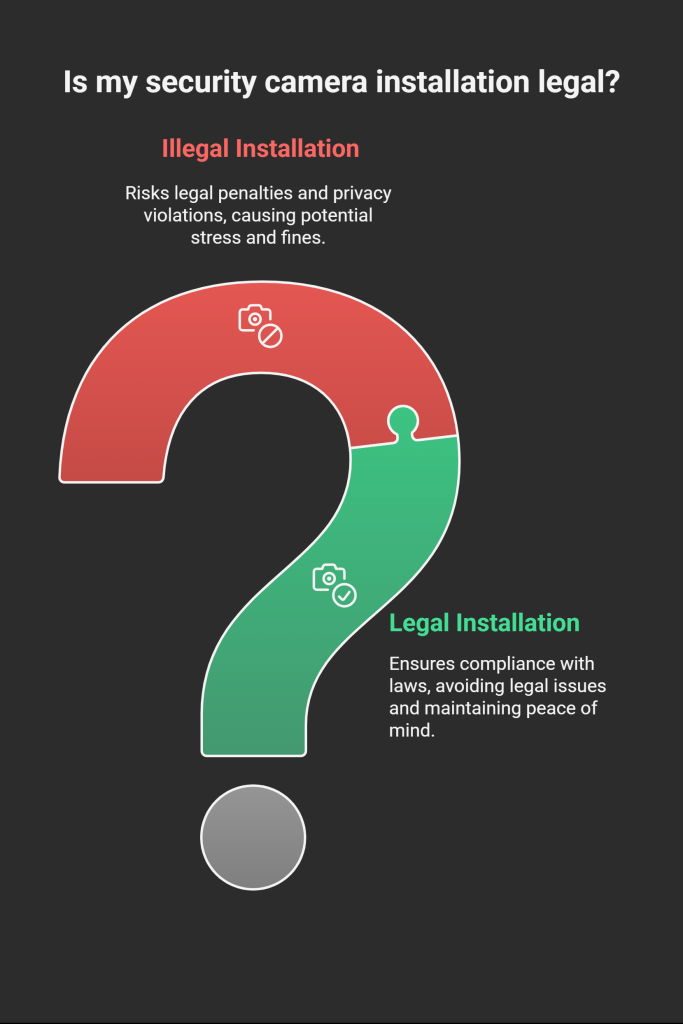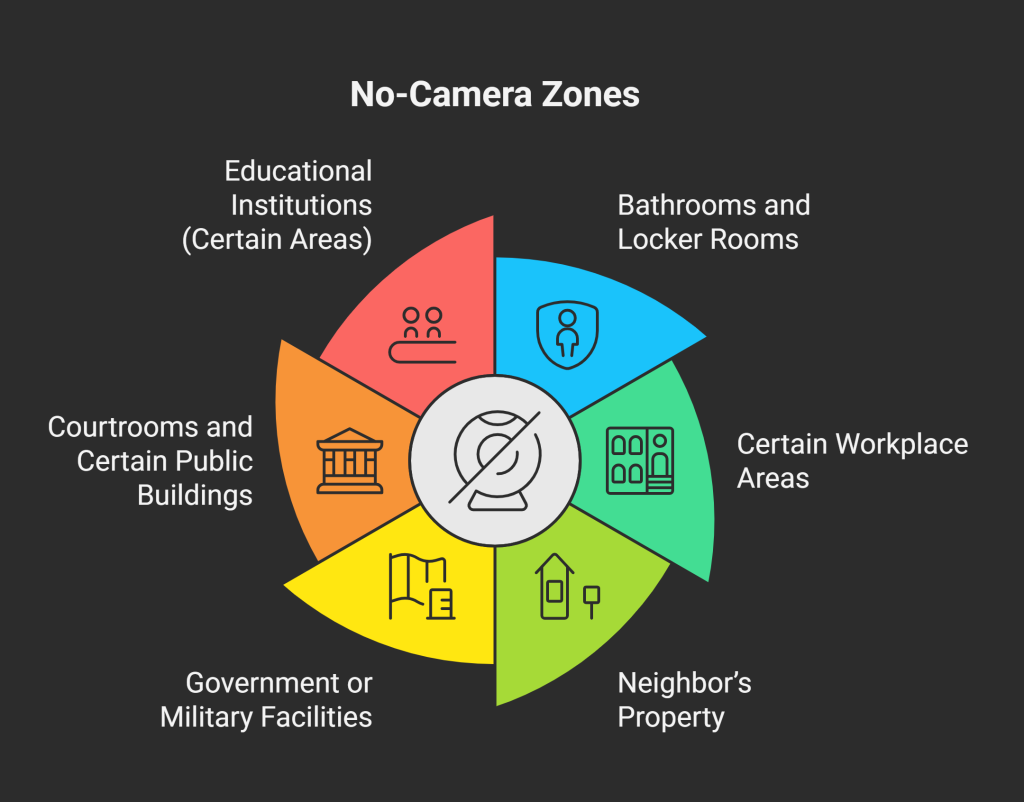Your Simple Guide to Where Cameras Are Allowed and Why Some Spots Are Off-Limits

Ever wondered if that security camera you’re planning to install might get you in trouble? You’re not alone! Millions of people are popping cameras up at home or work, but not everywhere is fair game. Laws about security cameras can be tricky, and breaking them could land you in hot water. Let’s dive into this easy guide to keep your cameras legal and your peace of mind intact.
Why Do Security Camera Laws Exist?
Picture this: you’re chilling in your backyard, and your neighbor’s camera is watching your every move. Creepy, right? That’s why laws exist—to protect your privacy while still letting cameras keep places safe. These rules make sure cameras don’t snoop where they shouldn’t, like in private spaces or someone else’s property.
Where Are Security Cameras Illegal?
The rules depend on where you live, and they can vary a lot. Here’s a quick look at some key places:
- Europe: In countries like Germany or France, privacy laws are super strict thanks to the General Data Protection Regulation (GDPR). If you’re filming in a public place, you need clear signs saying, “Smile, you’re on camera!” Plus, you can’t keep footage forever or let just anyone watch it. Pointing a camera into your neighbor’s garden? That’s a big no.
- United States: Every state has its own vibe. In California, for example, cameras in private spots like bathrooms are illegal under the penal code. Some states require everyone being recorded to agree if you’re capturing sound (hello, two-party consent laws!). If you’re in an apartment or a neighborhood with a homeowners’ association (HOA), they might have extra rules.
- Other Countries: In China, the government loves cameras, but private ones might face limits in certain spots. In Germany, recording someone without their okay—even in public—can cause trouble. Always check the local laws!
Where Security Cameras Are Almost Always Banned?
Some places are strict no-camera zones because privacy comes before surveillance. Even the best intentions can land you in legal trouble if you record in these locations. Here’s where you should never point a lens:

1. Bathrooms and Locker Rooms
Nobody wants to be filmed while showering, using the toilet, or changing clothes — and the law agrees. Most countries and U.S. states have strict rules banning cameras in restrooms, locker rooms, and fitting rooms. Violating these rules isn’t just rude; it can lead to criminal charges, hefty fines, and even jail time. Businesses, gyms, and public facilities are especially cautious about this to protect people’s dignity and avoid lawsuits.
2. Certain Workplace Areas
While some security cameras are allowed in workplaces for safety and theft prevention, there are exceptions. Employee break rooms, private offices, union meeting areas, or anywhere workers expect personal privacy may be off-limits. In many regions, labor laws require employers to notify staff about any monitoring and limit where cameras can be placed. Covertly recording employees in private spaces can violate privacy rights and lead to legal disputes.
3. Neighbor’s Property
Pointing your camera toward your neighbor’s yard, windows, or inside their home without permission is a serious invasion of privacy. Even if your camera is on your property, recording their private areas without consent could break local surveillance laws. The safest approach? Keep your camera focused only on your own property and use privacy zones or digital masking features to block out neighboring areas.
4. Government or Military Facilities
In many countries, security around government buildings, embassies, and military bases is tight — and surveillance devices are heavily restricted. Filming these areas without authorization can lead to questioning, confiscation of your equipment, or even arrest. Some regions also ban aerial drone footage near sensitive sites.
5. Courtrooms and Certain Public Buildings
Depending on the jurisdiction, cameras may be completely prohibited in courtrooms to protect the privacy of participants and maintain decorum. Similarly, hospitals, counseling centers, and certain public offices may ban cameras to safeguard patient and client confidentiality.
6. Educational Institutions (Certain Areas)
While security cameras may be allowed in school hallways or entrances, classrooms and private study spaces often require special permissions. Recording minors without proper consent can lead to legal complications, especially in countries with strict child privacy laws.
Bottom Line:
Just because you own a security camera doesn’t mean you can place it anywhere. Always check local privacy laws before installing a camera, and when in doubt, ask for written permission. A small adjustment in camera placement can save you from a big legal headache.
Where Security Cameras Are Almost Always Banned: Country & Location-Based Guide
While privacy laws differ around the world, certain locations are consistently off-limits no matter where you are. Many countries have similar rules, but penalties and enforcement can vary. Below is a breakdown based on country examples and specific locations.
1. United States
- Bathrooms, Locker Rooms, and Changing Rooms – Illegal in all states under privacy laws.
- Employee-Only Break Rooms or Private Offices – Restricted in many states, especially California, New York, and Illinois.
- Neighbor’s Property – Filming someone’s home interior or fenced backyard without consent can lead to civil lawsuits.
- Courtrooms – Varies by state; some allow cameras with permission, others ban them completely.
2. United Kingdom
- Private Homes Without Consent – Under the Data Protection Act, you must not record areas outside your property without a legitimate reason.
- Bathrooms, Staff Rooms, and Private Offices – Strictly banned in both public and private facilities.
- Hospitals and Care Homes – Recording is prohibited without consent due to patient confidentiality.
3. Canada
- Restrooms, Locker Rooms, and Personal Living Spaces – Always prohibited.
- Schools – Classrooms may require special approval; filming minors without consent is illegal.
- Court Buildings & Government Offices – Cameras often banned for security and privacy.
4. Australia
- Change Rooms and Toilets – Illegal nationwide under the Surveillance Devices Act.
- Neighbor’s Property – Banned under state privacy laws; heavy fines apply.
- Medical Facilities – Recording without consent breaches privacy laws and health regulations.
5. General International No-Camera Zones
- Military Bases – Most countries forbid filming due to national security risks.
- Border Checkpoints & Customs Areas – Restricted to prevent interference with operations.
- Airports (Security Screening Areas) – No filming to protect sensitive security procedures.
Bottom Line:
Even though rules differ between countries, the principle is the same — security cameras must never be placed where people have a reasonable expectation of privacy. Always check your local laws before installation to avoid heavy fines, legal trouble, or even criminal charges.
Top Questions People Are Searching Online About Security Cameras
Curious what others are asking about security camera laws? Here are some hot questions people search online, with answers to keep you in the know:
Can I put a camera in my apartment hallway?
It depends on your building’s rules and local laws. In many places, shared spaces like hallways require permission from your landlord or HOA. If the camera catches someone else’s door, you might need their okay to avoid privacy issues.
Is it legal to record audio with my security camera?
This one’s tricky! In some U.S. states, like California or Florida, you need everyone’s consent to record audio (two-party consent). Other places might be okay with video but not sound. Check your local laws before hitting record.
Can my neighbor’s camera film my backyard?
Nope, not cool. If their camera is pointed into your private space (like your backyard or windows), it could violate privacy laws. Politely ask them to adjust it, or check local laws to see if you can report it.
Do I need signs for my security cameras?
In many places, yes! Especially in Europe under GDPR, you need clear signs if your camera is in a public area. In the U.S., it’s often a good idea to avoid complaints, even if not required by law.
Can I use a hidden camera at home?
Hidden cameras are a gray area. In your own home, it’s usually okay for security, but you can’t film guests or workers (like babysitters) without their knowledge in most places. Hidden cameras in public or someone else’s space? That’s often illegal.
How to Keep Your Cameras Legal
Want to stay out of trouble? Follow these simple tips:
- Know Your Local Laws: Search online or call your city office to learn the rules where you live.
- Add Signs: A “Recording in Progress” sign can save you from legal headaches, especially in public areas.
- Respect Privacy: Make sure your camera doesn’t catch private spots like bathrooms or your neighbor’s windows.
- Get Permission: If your camera might film someone else’s property or shared spaces, ask first.
- Store Footage Safely: Don’t keep videos longer than needed, and make sure only trusted people can see them.
Wrap-Up: Stay Safe and Legal
Security cameras are a game-changer for keeping your home or business safe, but you’ve got to play by the rules. Privacy laws are there to make sure everyone feels respected, so take a moment to check what’s allowed in your area. Got a specific spot or situation in mind? Drop a comment or do a quick search for your local laws to stay on the right side of the lens!
